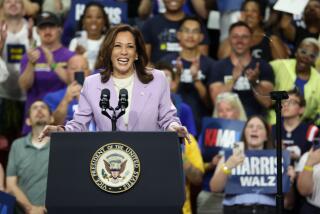Advocates Threaten to Push Power Initiative
Consumer groups said Wednesday that they might push for a ballot initiative that could close the door on attempts to deregulate California’s electricity market should Gov. Arnold Schwarzenegger veto a key power bill making its way through the Legislature.
The initiative would ask voters to permanently prohibit manufacturers, big-box stores and other major energy consumers from buying electricity at unregulated prices -- a key feature of deregulation scenarios favored by the Schwarzenegger administration, which has said consumers should be allowed to “choose their energy providers.”
“If we can figure out a way to bring this directly to the people of California, I think the response would be overwhelmingly favorable,” said Bob Finkelstein, executive director of the Utility Reform Network, a San Francisco ratepayers advocacy group also known as TURN. “After the [deregulation] experiment blew up in their faces in 2001, they’ll say, ‘Yeah, we’re not going to do that again.’ ”
TURN’s threat to try to decide the future of the state’s electricity market in the voting booth came after a news conference on the statehouse steps aimed at increasing pressure on Schwarzenegger to support a bill by Assembly Speaker Fabian Nunez (D-Los Angeles).
Nunez’s bill, AB 2006, represents the first major attempt by lawmakers to revamp California’s electricity generation, transmission and marketing system since a 1996 deregulation law led to rolling blackouts and spiking prices in 2000 and 2001.
Nunez and his allies say AB 2006 would protect against shortages by requiring that utilities have more than enough electricity on hand to handle demand on the hottest days -- either from their own power plants or through long-term contracts with private generating companies. The bill would ensure that utilities such as Southern California Edison Co. could charge their customers rates that were high enough to pay for the cost of building power plants.
The now-rescinded 1996 deregulation took utilities largely out of the power-generating business and forced them to obtain all their electricity on a daily spot market that turned out to be prone to manipulation by traders and private generating companies.
In its current form, the Nunez bill contains no provisions for a free market for electricity, and Schwarzenegger has telegraphed that he would veto it if it made it to his desk before the Legislature adjourns this month.
The governor has said that he wants lawmakers to pass a deregulation bill and leave other restructuring of the state’s electricity market to the California Public Utilities Commission, whose members are appointed by the governor. Nunez counters that the issue is so important that it must be fully vetted by elected legislators, not the governor’s appointees, to ensure that small-business and residential customers aren’t hit with sky-high utility bills.
A stalemate in this next-to-the-last week of the legislative session is fueling frustration on both sides. On Wednesday, Nunez conceded that he had had no direct communication with the governor’s office and noted that Friday would be the last day for negotiating changes in the bill that might lead Schwarzenegger to change his mind.
In the meantime, both sides have been waging media campaigns with full-page newspaper advertisements and talk radio spots that some observers said amount to opening shots in the upcoming initiative war. An energy measure could be put to voters as early as next year if the governor calls a special election.
In the current round of media attacks, independent generating companies accuse Rosemead-based Edison and Nunez of wanting to give investor-owned utilities a blank check to make ratepayers finance utility-built power plants. Consumer groups counter that Schwarzenegger, his big-business allies and private generators such as San Jose-based Calpine Corp. want to turn the clock back to the deregulated days of 2001.
Qualifying and winning an initiative could cost millions of dollars, so TURN said it would look for deep-pocketed supporters like Edison for help. Edison President Bob Foster, however, declined to speculate about an initiative.
For their part, private energy producers are preparing for a long struggle over restructuring California’s electricity market.
Edison has “thrown down the gauntlet ... about setting the future course of how the energy market will be structured in California,” said Jan Smutny-Jones, director of the Independent Power Producers Assn.
More to Read
Get the L.A. Times Politics newsletter
Deeply reported insights into legislation, politics and policy from Sacramento, Washington and beyond. In your inbox three times per week.
You may occasionally receive promotional content from the Los Angeles Times.











